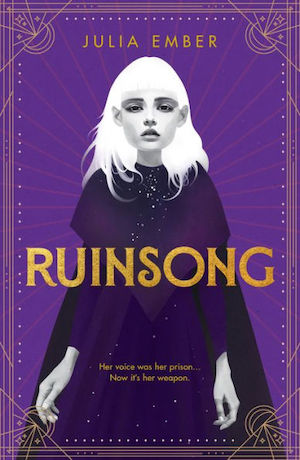Do you want a book with an ownvoices fat main character? With a diverse cast including queer, racial, disability, and polyamourous rep? With vivid descriptions and an intriguing world? Where tropes find deeper meaning in the current political climate? And where two girls from different worlds can’t stop sneaking lusty glances? Then you absolutely need to pick up Julia Ember’s The Phantom of the Opera-inspired YA fantasy Ruinsong.
The people of Cavalia are ruled by a queen with an iron fist, a short temper, and a taste for cruel punishments. Queen Elene took over after a bloody coup, sending the nobility scattering to the countryside. The queen gathers the magically inclined to her service. Those who refuse or who cannot live up to her high standards are thrown out like trash. As one of the most powerful magic singers in the land, Candace has been spared that fate, but her life isn’t much better. She lives in the lap of luxury with everything a girl could dream of, except freedom. Candace is little more than the queen’s pet, forced to perform songs to torture the nobles once a year.
At the most recent Performing, Candace reunites with her childhood friend Remi, the daughter of a viscount who hates the queen almost as much as Candace does. Remi is forced to move into the palace as Candace’s companion, and attraction sparks. With a revolution ticking like a time bomb, Candace and Remi will have to decide what side they will stand on. Will they choose a life that is comfortable but requires great personal sacrifice, or will they choose the path of great risk and even greater reward?
Buy the Book


Ruinsong
At first, it seems like Julia Ember has made the nobility the oppressed class. Queen Elene took over after a brutal revolution that resulted in the slaughter of hundreds of elites. Her campaign of terror continues all these years later, with her secret police disappearing people, nobles being barred from receiving magical medical treatment from singers, and her having singers torture nobles en masse once a year. However, the only people in Cavalia that consider the nobles as the most oppressed group are the nobles themselves.
Queen Elene thinks herself a ruler of the common people, and many of the commoners like her for knocking the nobility off of their pedestals, but the system she found so egregious remains intact. The upper class still have their ivory towers and wealth, the lower class still have nothing, and the middle class have found themselves slowly sliding into poverty. During her takeover, most of the rich retreated to the safety of their country estates. The poor, like Candace’s family, didn’t have that opportunity. For all her talk of corruption among the elites, Elene’s revolution changed little; new figurehead, old power structure.
Readers wanting a heroine who rushes head first into danger and uses her fists as often as her voice will be disappointed with Candace. And frankly, I think her reluctance is a good thing. Ember understands that there are many ways to resist. A revolution cannot be won solely through battle and bloodshed. Hearts must be won and minds changed. The privileged may not hold nearly as much real, demonstrable power as their position implies and the oppressed can affect more change than they realize. Remi wants Candace to fight back, but Candace has experienced first hand what it feels like when the most powerful person in your world decides to punish you. As she tells Remi, Remi feels the brunt of the Queen’s wrath once a year but Candace has to live it every moment of her life.
Layered underneath the calls for overthrowing a fascist dictator are the quieter conversations about living with an abuser. Candace survives, but barely. She is terrified of staying and even more terrified of what will happen to her if she tries to leave. Her entire existence is dedicated to keeping Elene from lashing out or taking out her anger at Candace on those Candace cares for. Small things that would seem petty or childish to others feel like private acts of rebellion to Candace, because small things that go unnoticed or are disregarded are the only things she can get away with. She doesn’t have the luxury of running a secret revolution from the privacy of her country estate, nor is she ignored or disregarded enough to plan for an overthrow. Remi is right to be angry at Candace for carrying out the queen’s violence, but Candace is also right in that she has fewer choices than others (although she has been abused for so long that she can’t see that she has more choices than she realizes).
Taking all that into consideration, it’s tempting to want Candace to come out the other end of her redemption arc as the beloved hero. But Ember doesn’t let her off the hook so easily. Candace understands that her actions, as unwilling as they were, are reprehensible. Siding with the rebels doesn’t undo or make up for the damage she caused. Regardless of whether or not they can successfully topple Queen Elene, Candace has real reparative work to do.
Young adult fiction devotes a lot of space to revolutions. It’s a ridiculously common theme, and not just in dystopian fiction. Put a historical fantasy twist on it, set it in an alternate world inspired by a real world culture, mix in characters from different economic or social stations, and boom, you’ve got a rebellion. Julia Ember, known for writing sapphic young adult historical fantasy books that dabble equally in romance and violence, blends the rebellion theme with The Phantom of the Opera in Ruinsong. And somehow it works. Like, really, really, really works.
Ruinsong is available from Farrar, Straus and Giroux.
Alex Brown is a librarian by day, local historian by night, author and writer by passion, and an ace/aro Black person all the time. Keep up with her on Twitter, Instagram, and her blog.










